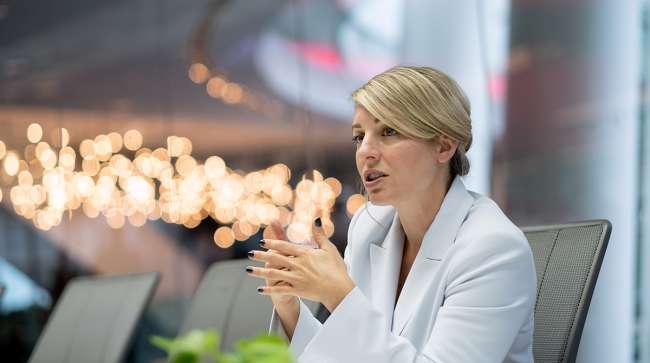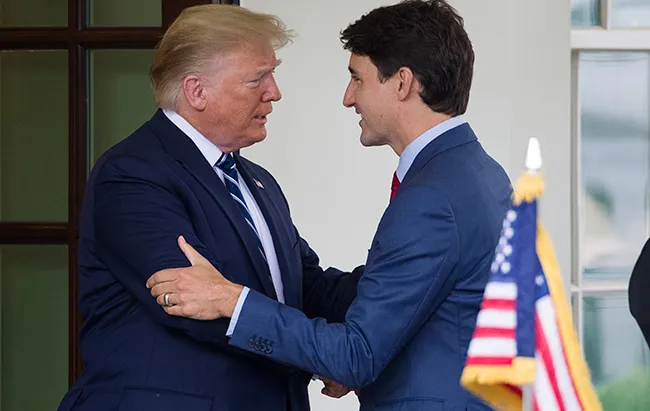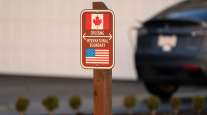Bloomberg News
Canada to Open Alaska Consulate to Deepen Arctic Partnership

[Stay on top of transportation news: Get TTNews in your inbox.]
Canada will establish two new Arctic consulates in Alaska and Greenland and appoint a dedicated Arctic ambassador as part of a long-awaited strategy for a region where Russia and China are increasingly seeking to assert their influence.
The creation of a diplomatic presence in Anchorage, Alaska, in particular, is seen as important to managing Canada’s relations with President-elect Donald Trump, which have been severely strained in recent weeks over his threat to impose hefty tariffs and pressure to tighten border security.
“Canada must be strong in the North American Arctic, and it requires deeper collaboration with its greatest ally, the United States,” Melanie Joly, Canada’s minister of foreign affairs, said in the document.
It also needs to maintain strong ties with its five Nordic allies, who are all North Atlantic Treaty Organization members, she said. To that end, Canada will launch an Arctic security dialogue with the foreign ministers of like-minded states in the region.

President Donald Trump greets Canadian Prime Minister Justin Trudeau upon his arrival at the White House on June 20, 2019. (Alex Brandon/AP/file)
Canada-U.S. security has long been integrated in the Arctic through the North American Aerospace Defense Command, a joint organization that provides air protection and warnings for the two countries. Canada has promised C$38.6 billion ($27.4 billion) to modernize NORAD, and it’s also pledged to reach the NATO spending target of 2% of gross domestic product by 2032. Trump expects all member countries to swiftly meet that threshold and Republicans have said Canada’s timeline is too slow.
In July, the Pentagon released its own Arctic strategy, which was heavily focused on China’s Arctic ambitions and growing ties with Russia in the region. Days later, the U.S. tracked Russian and Chinese bombers flying together off the coast of Alaska for the first time.
Canada’s new strategy, containing C$34.7 million in new spending over five years, comes after the country pledged to increase its military presence in the Arctic in its defense policy update earlier this year. The update included C$8.1 billion in funding over the next five years as well as a pledge to spend billions on under-ice capable submarines.
Lori Heino-Royer of Waabi discusses the latest developments, breakthroughs and key industry partnerships in autonomous trucking. Tune in above or by going to RoadSigns.ttnews.com.
While little is known about how Trump will advance America’s Arctic priorities once he takes office — critical information for Canadian planning — the past may offer a guide.
“During the first Trump administration we saw an interest in closer ties with Greenland, we saw an interest in Arctic oil and gas and economic development, and we saw an interest in bolstering the United States icebreaker fleet,” Rebecca Pincus, director of the Polar Institute at the Wilson Center in Washington, said in an interview Dec. 5. “We also saw a real emphasis on burden sharing and really pushing some of our allies on the 2% spending threshold.”
Beyond that, much will depend who is confirmed in U.S. key positions, especially when it comes to future policy toward Russia. The messaging is clearer around the perceived threat posed by China in the Arctic and has tended to have broad bipartisan support, Pincus said.
As for North American continental defense, she expects that will be a Trump priority because of his focus on border security, which includes America’s northern borders and also feeds into the need to modernize NORAD.
But others are more skeptical about Trump’s spending intentions on continental defense, including the Arctic, and say the difficulty for Canada will come if there’s no clarity.
“I think that’s going to make it problematic for Canada,” retired Canadian General Scott Clancy, a former director of operations for NORAD, said in an interview earlier this week. “What does Canada latch onto, in terms of assisting, whether it’s Arctic security or NORAD security?
Want more news? Listen to today's daily briefing above or go here for more info
Canada’s role in Arctic security is most likely to come into play on the Pacific side, because of heightened fears around China, said Andreas Østhagen, senior researcher at the Fridtjof Nansen Institute in Norway, also speaking before the release of the strategy.
That, in turn, may lead to more pressure on Canada from Trump to increase its defense spending as a share of GDP. Canada’s NATO allies, though, will be keen to redirect the focus to the security threat posed in the European Arctic.
“The big conversation right now in Oslo, in Helsinki and in Stockholm is how do we make sure that the Trump administration incoming really understands the complexities of our security situation and doesn’t get too focused on China and the Pacific side of things,” he said.





